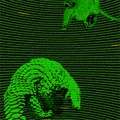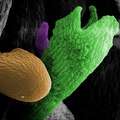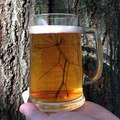PLOS Genetics
| Discipline | Genetics |
|---|---|
| Language | English |
| Edited by | Gregory S. Barsh (ORCiD 0000-0002-0838-1042) and Gregory P. Copenhaver (ORCiD 0000-0002-7962-3862) |
| Publication details | |
Publication history | 2005–present |
| Publisher | |
| Frequency | Monthly |
| Yes | |
| License | Creative Commons Attribution License |
| 6.100 | |
| Standard abbreviations | |
| PLoS Genet. | |
| Indexing | |
| ISSN |
1553-7390 (print) 1553-7404 (web) |
| LCCN | 2004216451 |
| OCLC no. | 57175564 |
| Links | |
PLOS Genetics is an open access peer-reviewed genetics-focused journal established in 2005 by the non-profit organization Public Library of Science (PLOS).[1] Out of the seven PLOS journals, it is one of the four "community journals" (along with PLOS Computational Biology, PLOS Pathogens, and PLOS Neglected Tropical Diseases).
The journal is run by an international Editorial Board. The founding Editor-in-Chief was Wayne N. Frankel (Columbia University Medical Center, NY, USA), and the current Editors-in-Chief are Gregory S. Barsh (HudsonAlpha Institute of Biotechnology, AL, USA, and Stanford University School of Medicine, CA, USA) and Gregory P. Copenhaver (The University of North Carolina at Chapel Hill, NC, USA).
Journal
Scope
The journal scope of PLOS Genetics is to feature works emphasizing studies of broad interest that provide significant insight into a biological process or processes. Topics include (but are not limited to) gene discovery and function, population genetics, genome projects, comparative and functional genomics, medical genetics, disease biology, evolution, gene expression, complex traits, chromosome biology, and epigenetics.
Contents
PLOS Genetics contains several sections and article types. Research Articles are sub-categorised into one of the following six categories: general, cancer genetics, epigenetics, evolution, natural variation, and prokaryotic genetics.
As well as research articles PLOS Genetics publishes Editorials, Formal Comments, Interviews, Perspectives, Reviews, and Viewpoints.
Metrics
PLOS supports DORA – the San Francisco Declaration on Research Assessment[2][3] and uses Article-Level Metrics (ALMs) to measure the impact of articles based on their individual merits rather than using the journal impact factor.[4] Traditionally, the impact of research articles has been measured by the publication journal, but this particular view is one that examines the overall performance and reach of the articles themselves. ALMs are noted on each article to mark how often they are viewed, cited, saved, discussed/shared or recommended in order to assess work at the article level.[5]
ALMs are available, upon publication, for every article published by PLOS.[6]
Abstracting and Indexing
The journal is indexed in PubMed Central, PubMed, and Web of Science.
Open Access
As part of the open access initiative, PLOS is committed to ensuring the availability of data and materials that underpin any articles published in PLOS journals.[7] PLOS's ideal is to make all readily replaceable data and materials relevant to a given article immediately available without restrictions (while not compromising confidentiality in the context of human-subject research).[8][9]
The Creative Commons Attribution (CC BY) License is applied to all items published in PLOS Genetics.[8] Under the CC BY License, authors retain ownership of the copyright for their article, but authors allow anyone to download, reuse, reprint, modify, distribute, and/or copy articles in the journal, so long as the original authors and source are cited. Under this licence no permission is required from the authors or the publishers.[8][9]
Community Engagement
PLOS Genetics Research Prize: The PLOS Genetics Research Prize is an annual event opened to the genetics community with the objective to highlight papers published the previous year.[10] Members of the genetics community are invited to nominate their favorite PLOS Genetics Research Article for a monetary prize opportunity.[11]
PLOS Biologue: PLOS Biologue is a channel for several PLOS journals (PLOS Biology, PLOS Computational Biology, and PLOS Genetics) and guest bloggers to engage with the readers, research and non-research audiences on topics ranging from open access publishing development and science policy, to science outreach and education.
Understanding Images: Understanding Images is a collection of posts and articles from a PLOS Genetics blog series. The aim of the series is to showcase the research that created or inspired the journal's cover image, and explain how the image helps us to understand the research question addressed in the manuscript.
Deep Reads: Deep Reads is a collection of yearly installments that aims to provide recommendations for books in the realms of genetics and beyond. The Deep Reads blog series is a spin-off from this, where other science enthusiasts discuss books that have inspired them. From biographies of struggling scientists to light-hearted accounts from the animal kingdom, "Deep Reads" aims to highlight the diversity that science-themed books have to offer.
Topic Pages: Topic Pages are broad review articles for PLOS Computational Biology and PLOS Genetics that are dual-published both in the journal (as a copy of record) and Wikipedia, acting as a living document that will be updated and enhanced by the Wikipedia community.[12] See a case study[13] on publishing scholarly papers on Wikipedia and the introductory blog post, as well as PLOS Computational Biology's Editorial and Topic Pages Collection.
Twitter: Community members can follow PLOS Genetics for news and updates on the social networking service Twitter under the username handle @PLOSGenetics.
Gallery
Due to the Creative Commons Attribution Licence all figures and images from PLOS Genetics can be reused in places other than the journal's website, e.g. to illustrate Wikipedia articles.
 Armadillo and Pangolin interaction represents the hallmark of the Wnt/Wingless (Wg) signaling response. Image Credit: Alexandra Franz; pgen.v13.i04
Armadillo and Pangolin interaction represents the hallmark of the Wnt/Wingless (Wg) signaling response. Image Credit: Alexandra Franz; pgen.v13.i04 Pictured is an artist's interpretation of how a couple might experience 'social genetic effects', and how research could help improve health. Image Credit: Illustration by Spencer Phillips, European Bioinformatics Institute (EMBL-EBI); pgen.v13.i01
Pictured is an artist's interpretation of how a couple might experience 'social genetic effects', and how research could help improve health. Image Credit: Illustration by Spencer Phillips, European Bioinformatics Institute (EMBL-EBI); pgen.v13.i01 RNA processing and plant ovule identity. Image Credit: E. Rodríguez-Cazorla, A. Martínez-Laborda, A. Vera;pgen.v14.i01
RNA processing and plant ovule identity. Image Credit: E. Rodríguez-Cazorla, A. Martínez-Laborda, A. Vera;pgen.v14.i01 Complex ancestries of wild and brewing yeasts. Image Credit: A. B. Hulfachor, University of Wisconsin-Madison; pgen.v12.i07
Complex ancestries of wild and brewing yeasts. Image Credit: A. B. Hulfachor, University of Wisconsin-Madison; pgen.v12.i07_December_2015.tif.jpg) RAB-10 regulates dendritic branching by balancing dendritic transport. Image Credit: Caitlin Taylor, Shen Lab, Stanford University; pgen.v11.i12
RAB-10 regulates dendritic branching by balancing dendritic transport. Image Credit: Caitlin Taylor, Shen Lab, Stanford University; pgen.v11.i12_October_2014.tif.jpg) Claudin 1, Ecadherin and keratin 14 in the tail skin of a mouse. Image Credit: Tia DiTommaso; pgen.v10.i10
Claudin 1, Ecadherin and keratin 14 in the tail skin of a mouse. Image Credit: Tia DiTommaso; pgen.v10.i10_June_2013.tif.jpg) Drosophila testis and male genital tract showing expression of a reporter construct. Image Credit: Helen White-Cooper; pgen.v09.i06
Drosophila testis and male genital tract showing expression of a reporter construct. Image Credit: Helen White-Cooper; pgen.v09.i06_May_2012.tif.jpg) Inactivation of FAM20C leads to hypophosphatemic rickets. Image Credit: Xiaofang Wang (Texas A&M Health Science Center, Baylor College of Dentistry); pgen.v08.i05
Inactivation of FAM20C leads to hypophosphatemic rickets. Image Credit: Xiaofang Wang (Texas A&M Health Science Center, Baylor College of Dentistry); pgen.v08.i05_March_2011.tif.jpg) Female adult of the water flea Daphnia magna. Image Credit: Hajime Watanabe; pgen.v07.i03
Female adult of the water flea Daphnia magna. Image Credit: Hajime Watanabe; pgen.v07.i03_February_2010.tif.jpg) A juvenile stickleback head stained red for developing bone and blue for forming cartilage. Image Credit: Mark Currey (Center for Ecology and Evolutionary Biology, University of Oregon, USA); pgen.v06.i02
A juvenile stickleback head stained red for developing bone and blue for forming cartilage. Image Credit: Mark Currey (Center for Ecology and Evolutionary Biology, University of Oregon, USA); pgen.v06.i02
References
| Wikimedia Commons has media related to PLOS Genetics. |
- ↑ Frankel, W.N. (2005). "Introducing PLoS Genetics". PLoS Genetics. 1 (1): e21. doi:10.1371/journal.pgen.0010021037. PMC 1183532. PMID 7411333.
- ↑ "PLOS and DORA". PLOS.
- ↑ "DORA Signers". DORA.
- ↑ "Public Library of Science (PLOS)". Lagotto.
- ↑ "What are Article-Level Metrics". SPARC.
- ↑ "Measuring your research impact: PLoS Article-Level Metrics". Cornell University Library. 10 January 2017.
- ↑ "Data availability". PLOS.
- 1 2 3 "RCUK Open Access Policy". PLOS.
- 1 2 Bourne, P.E.; Fink, J.L.; Gerstein, M. (2008). "Open Access: Taking Full Advantage of the Content". PLoS Computational Biology. 4 (3): e1000037. doi:10.1371/journal.pcbi.1000037. PMC 2275780. PMID 18369428.
- ↑ "PLOS Genetics launch $5000 research prize". Front Line Genomics. 27 August 2015.
- ↑ "Launching the PLOS Genetics Research Prize 2015". PLOS. 25 August 2015.
- ↑ "PLOS wiki". PLoSWiki. 22 January 2018.
- ↑ "Publishing scholarly papers with, and on, Wikipedia". Wikimedia. 28 March 2014.